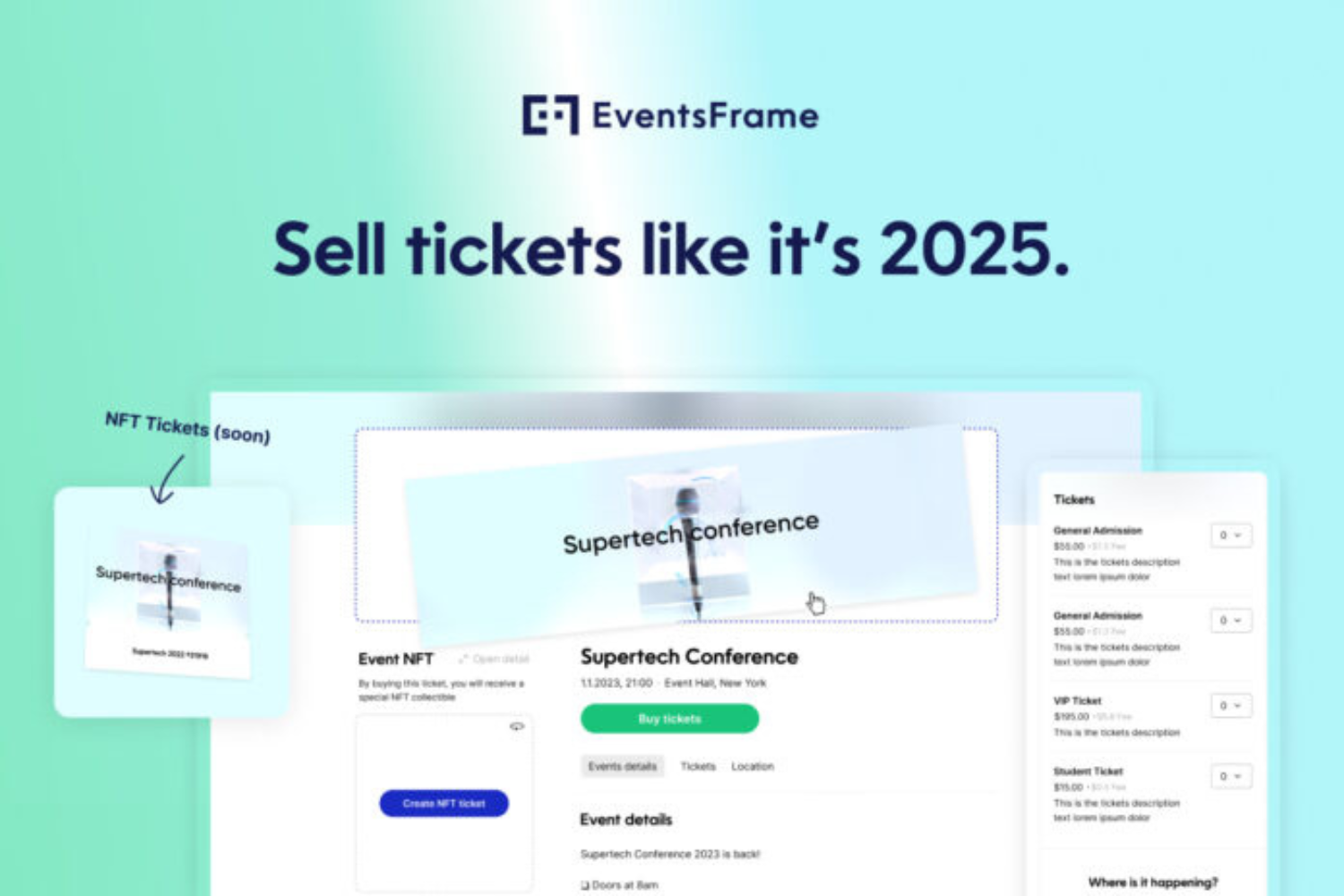EventsFrame's NFT ticketing solution can be used for ticketing, collectibles and digital gifts.
When the pandemic disrupted the live events industry, the team at ticketing platform EventsFrame was “looking for things to do,” recalls Pavel Helstyn, the company’s head of business development. They already held regular brainstorming sessions about where the industry is going and how best to offer value, but these conversations turned into action and, as of this month, a new product.
EventsFrame now offers a blockchain-backed NFT ticketing solution, an early realization of an idea whose potential has been bandied about in numerous panels and conversations over the past couple of years. While Candy Digital and Ticketmaster have created commemorative NFT tickets for MLB and NFL games, the tokens are not yet the actual means of admission.
“The whole thing is a huge pivot,” says Helstyn. “I think we can say we are one of the first few to the markets, and perhaps the only ones at this point who have a solution that can quickly be deployed at scale for event organizers.”
Among the 4,000 event organizers who have utilized EventsFrame’s original ticketing platform are TikTok, the UN and TEDx, and that business will remain in operation. But the Prague-based company now has a Web3 option.
“We’re looking to enhance the experience for the people who go to the events, but also we’re looking at how you can monetize the improved experience,” he says.
Attendees who simply want to use a ticket for its original purpose won’t see any difference, Helstyn adds, but those who are more tech-savvy can buy these tickets with crypto, store them in an ethereal wallet or access exclusive content that event organizers attach to the non-fungible token, such as videos or memberships.
We’re looking to enhance the experience for the people who go to the events, but also we’re looking at how you can monetize the improved experience.
Teams, leagues or other organizers can employ NFT tickets to stymie scalping, earn royalties on secondary market sales or further monetize events. One such idea currently under development is a digital merchandise shop. Given the rise of the metaverse and other virtual experiences, Helstyn says event-specific apparel will have a home in Web3.
“It’s a developing process, and we are constantly finding new things that we should be working on. Obviously, there’s certain technology that’s underlying, but for example, one of the things that we’re working on right now—and that’s the next stage—is a merch shop, which should be integrated in our platform,” he says.
“You’re going to have the real-life sweatshirt, which is going to cost something, and then you’re going to have the digital sweatshirt, which is maybe going to be 30%, 50% less. But it’s still going to allow the person who goes to the event to take something away something to keep something very sustainable, something that they can keep pretty much forever, and something that they can very easily resell further down the road.”
A few early NFT ticketing pilots have taken place, such as VeeCon, the event hosted by Gary Vaynerchuk last May at the Minnesota Vikings’ US Bank Stadium. ASM Global, which operates the venue, said 10,255 NFT tickets were sold. SeatGeek has discussed its development of NFT tickets, hiring blockchain executive Greg Warden as VP of engineering last year.
SeatGeek’s chief product officer Eric Waller outlined use cases in a SportTechie-hosted panel last December, describing a goal of organizers gaining a “full unadulterated view of the life cycle of a ticket.” There are monetary benefits as well as for understanding fan demographics—knowing who is actually attending events has long vexed venues.
“Certainly there are many examples where there are resale transactions that happen outside of the purview of the ticketing system, and I think everyone is naturally very interested in capturing some understanding of every resale that happens and potentially a royalty,” Waller said.
Photo credits: Courtesy of EventsFrame
Our own senior writer and tennis novice Joe Lemire tried using the iOS tennis tracking app SwingVision to improve his game. SwingVision uses computer vision from an iPhone or iPad to provide detailed shot analytics and automated video reels.
DigiSign by Virtual Tables has proprietary software that allows for virtual autograph session that result in an authenticated digital signature.
Therabody, the recovery technology company widely endorsed by sports teams and athletes, is expanding its products from muscle recovery into sleep with their first wearable.
SportTechie spoke with the NBA's basketball technology and innovation lead about the league's Launchpad program as it begins to solicit applications for its second edition. The areas of focus include basketball-specific and fan-based categories.
SportTechie spoke with Olympic sprinter Aleia Hobbs about her experience wearing an Aura Strap 2 affixed to her Apple Watch. In addition to Apple’s heart rate data, Hobbs has also been using the Aura to track biometrics such as body composition and hydration during training and racing.

